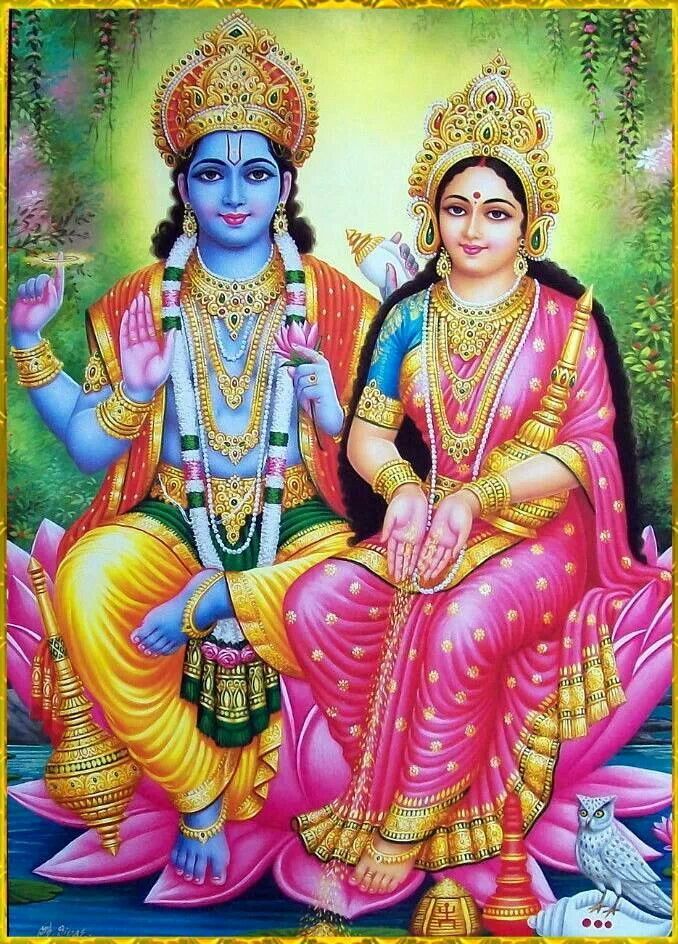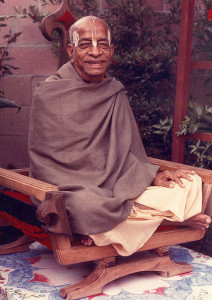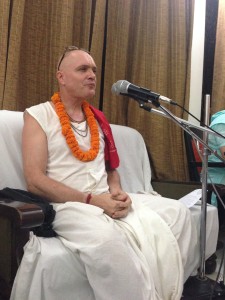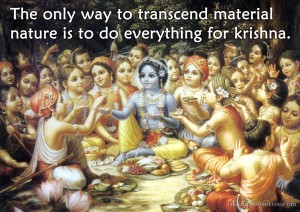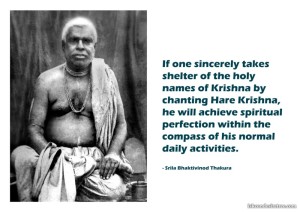Hare Krishna.
9th July, 2015. Gurgaon
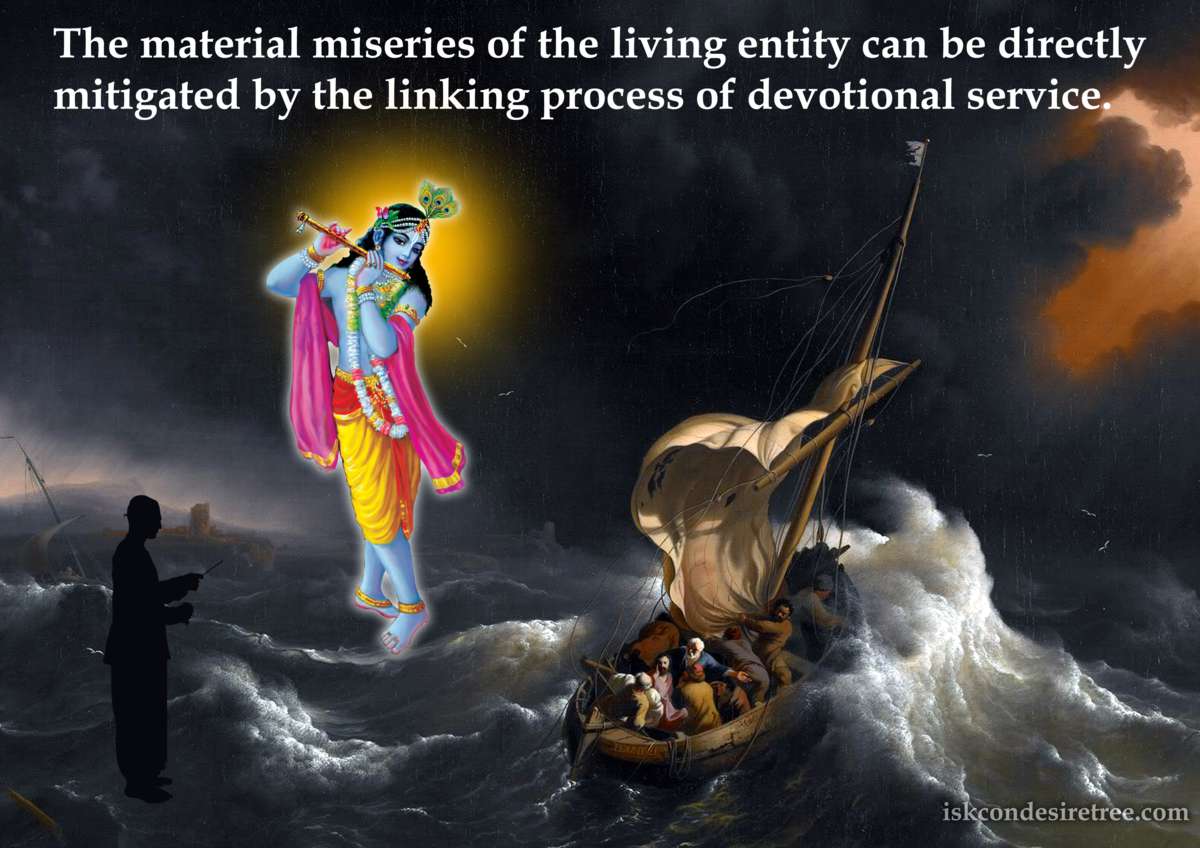
I was a preparing for a brief session on the second chapter of book `Essence of Bhagavad Gita’ last two days on material miseries, namely adhyaatmik, adibhautik and adidaivik kleshas. As I was preparing for the class I thought that this particular session is getting more heavy in negativity. Some times we also hear that we have no solution to them and the only way is to tolerate them. I wrote about these three miseries in my last blog on how one can attain peace. But some piece seemed to be missing in my heart.
Hence it was a great coincidence that yesterday morning I read some wonderful verses in Bhagavatam, SB 3.25.23, 24 & 25 and their enlightening purports by Srila Prabhupada on this very same topic. They showed how simple and easy the process to overcome material miseries really is. It is we who have no faith in it. This chapter is very aptly named `The Glories of Devotional Service’.
mad-āśrayāḥ kathā mṛṣṭāḥ śṛṇvanti kathayanti ca
tapanti vividhās tāpā naitān mad-gata-cetasaḥ (SB 2.25.23)
Who can overcome the three miseries of the material world.
Sadhus or devotees of the Lord to overcome three miseries of the material world.
Srila Prabhupada writes in his purport that There are multifarious miseries in material existence — those pertaining to the body and the mind, those imposed by other living entities and those imposed by natural disturbances. But a sādhu is not disturbed by such miserable conditions because his mind is always filled with Kṛṣṇa consciousness, and thus he does not like to talk about anything but the activities of the Lord. Mahārāja Ambarīṣa did not speak of anything but the pastimes of the Lord. Vacāṁsi vaikuṇṭha-guṇānuvarṇane (Bhāg. 9.4.18). He engaged his words only in glorification of the Supreme Personality of Godhead. Sādhus are always interested in hearing about the activities of the Lord or His devotees. Since they are filled with Kṛṣṇa consciousness, they are forgetful of the material miseries. Ordinary conditioned souls, being forgetful of the activities of the Lord, are always full of anxieties and material tribulations. On the other hand, since the devotees always engage in the topics of the Lord, they are forgetful of the miseries of material existence.
So what should we do to overcome these miseries ?
ta ete sādhavaḥ sādhvi sarva-saṅga-vivarjitāḥ
saṅgas teṣv atha te prārthyaḥ saṅga-doṣa-harā hi te (SB 3.25.24)
Translation
O My mother, O virtuous lady, these are the qualities of great devotees who are free from all attachment. You must seek attachment to such holy men, for this counteracts the pernicious effects of material attachment.
Prabhupada writes Kapila Muni herein advises His mother, Devahūti, that if she wants to be free from material attachment, she should increase her attachment for the sādhus, or devotees who are completely freed from all material attachment…… A person may be materially very rich, opulent or respectable, but if he at all wants to transfer himself to the spiritual kingdom, back home, back to Godhead, then he has to be freed from the puffed-up condition of material possessiveness, because that is a false position.
A pure soul who is prepared to be freed from this material entanglement must first of all be free from the association of the three modes of nature. Our consciousness at the present moment is polluted because of association with the three modes of nature; therefore in Bhagavad-gītā the same principle is stated. It is advised, jita-saṅga-doṣāḥ: one should be freed from the contaminated association of the three modes of material nature. Here also, in the Śrīmad-Bhāgavatam, this is confirmed: a pure devotee, who is preparing to transfer himself to the spiritual kingdom, is also freed from the association of the three modes of material nature. We have to seek the association of such devotees.
Where to find such association?
Under ISKCON.
Prabhupada say ‘For this reason we have begun the International Society for Krishna Consciousness. There are many mercantile, scientific and other associations in human society to develop a particular type of education or consciousness, but there is no association which helps one to get free from all material association. If anyone has reached the stage where he must become free from this material contamination, then he has to seek the association of devotees, wherein Kṛṣṇa consciousness is exclusively cultured. One can thereby become freed from all material association’.
How is it possible? Give an example.
Prabhupada explains ‘Because a devotee is freed from all contaminated material association, he is not affected by the miseries of material existence. Even though he appears to be in the material world, he is not affected by the miseries of the material world. How is it possible? There is a very good example in the activities of the cat. The cat carries her kittens in her mouth, and when she kills a rat she also carries the booty in her mouth. Thus both are carried in the mouth of the cat, but they are in different conditions. The kitten feels comfort in the mouth of the mother, whereas when the rat is carried in the mouth of the cat, the rat feels the blows of death. Similarly, those who are sādhavaḥ, or devotees engaged in Kṛṣṇa consciousness in the transcendental service of the Lord, do not feel the contamination of material miseries, whereas those who are not devotees in Kṛṣṇa consciousness actually feel the miseries of material existence. One should therefore give up the association of materialistic persons and seek the association of persons engaged in Kṛṣṇa consciousness, and by such association he will benefit in spiritual advancement. By their words and instructions, he will be able to cut off his attachment to material existence’.
Just reading these verses and their nectarean purports filled my heart with a feeling of spiritual bliss and more faith that as we progress in our devotional journey and take shelter of the lotus of Lord and His devotees then all miseries of the world become the size of mustard seeds. We must continue to seek and serve such devotees of the Lord and make our life successful.
My little session too ended on a positive note last evening as I now know of an assured solution to these three seeming insurmountable problems.
All glories to Srimad Bhagavatam
All glories to Sri Guru and Gauranga.
All glories to Srila Prabhupada.


